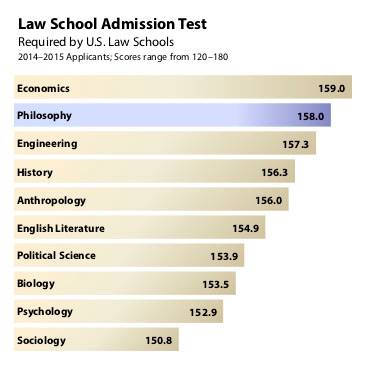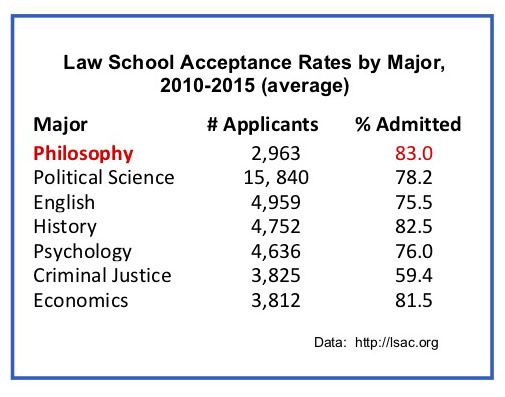Law schools will tell you that a major in philosophy provides excellent preparation for law school and a career in law.
Philosophy excels as a pre-law major because it teaches you the very proficiencies that law schools require: developing and evaluating arguments, writing carefully and clearly, applying principles and rules to specific cases, sorting out evidence, and understanding ethical and political norms.
The American Bar Association (ABA) indicates that there are core skills, values, knowledge, and experience that will provide a solid basis for a legal education. These include: skills in problem-solving, critical reading, writing and editing, oral communication and listening, and research. A Philosophy major is excellent preparation for acquiring these skills.
| PROBLEM SOLVING | The ABA suggests that students take courses that require critical thinking, challenge their beliefs, and encourage them to develop a tolerance for uncertainty and criticism. In law school, students will be required to structure and evaluate arguments for and against various propositions. | Philosophy students are not only required to take courses in logic and reasoning, but are expected to deploy these skills in all of their coursework. Philosophy students develop extensive experience in analyzing, formulating, and critically evaluating arguments. |
| CRITICAL READING | The ABA states that students can prepare for their legal education by acquiring "substantial experience at close reading and critical analysis of complex textual material." | A major in Philosophy involves extensive coursework in which students are required to engage in close reading and analysis of difficult texts on an ongoing basis. This is a core feature of all philosophy courses. |
| WRITING AND EDITING | The ABA stresses the importance of a high level of skill in written communication and recommends students prepare by seeking out courses that will require rigorous and analytical writing, including the writing of original papers of significant length and the revising of work in response to criticism. | A Philosophy major requires that students write dozens of papers in the course of their program that involves research, original thinking, and substantial revision in response to comments from a supervisor and student peers. |
| ORAL COMMUNICATION AND LISTENING | The ABA indicates the importance of speaking clearly and persuasively and of developing listening skills, and suggests that students gain experience in engaging in debate and making formal presentations. | The Philosophy major provides an excellent opportunity for developing skills in oral debate through classroom discussions. Students in the Philosophy major at ETSU are required to take a Senior Seminar in which they formally present their work to one another and critically discuss one another's projects. |
| RESEARCH | The ABA recommends that students prepare for the research demands of law school by undertaking a project that requires significant library research and analysis of information. | All Philosophy majors at ETSU learn how to do library research as part of the program and are required to do this kind of research for their senior papers. |
Philosophy majors do very well on the LSAT (Law School Admission Test), typically scoring higher than the vast majority of other majors.

The acceptance rate for philosophy majors is higher than that of all other majors most often chosen by students applying to law school.

A significant percentage of ETSU Philosophy majors go on to study at law school.

Critical thinking is critical to my job as an attorney. So too writing forceful and correct arguments. In fact, law requires a deep commitment to sound reasoning, uncovering the truth, and instantiating justice. These commitments sound philosophical because they are, and a philosopher's toolkit will serve any attorney well.